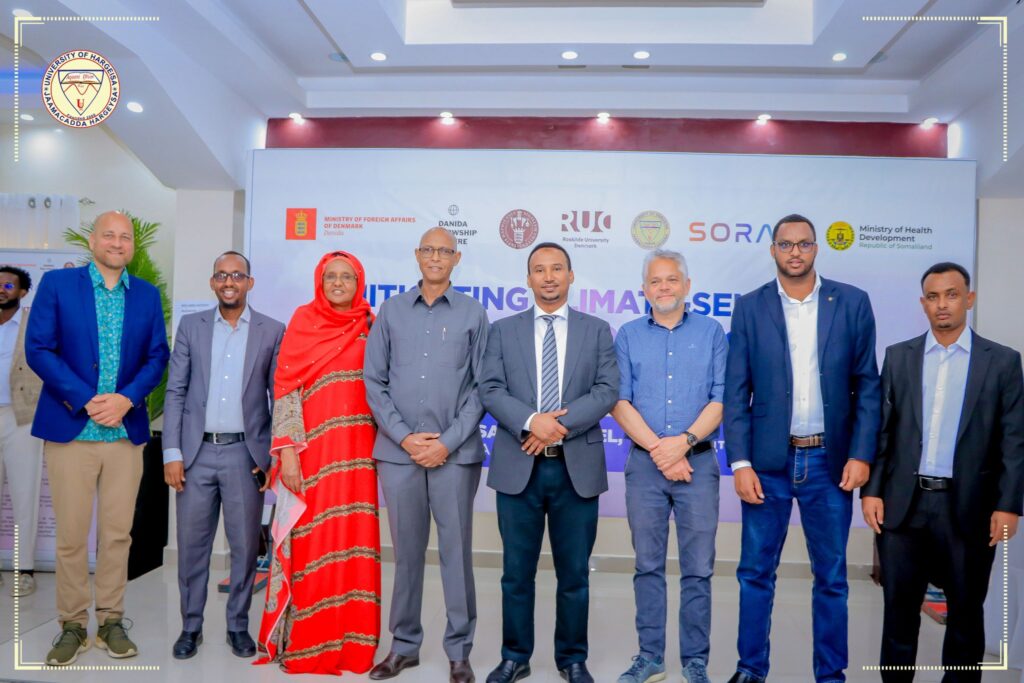
FFU Grand Launching Ceremony for the project “mitigating climate-sensitive disease vectors among internally displaced persons (IDPs) in Somaliland”
On 14th May 2025, the University of Hargeisa, in collaboration with the University of Copenhagen, Roskilde University, Denmark, the Ministry of Health Development Somaliland, and SORADI in a grand ceremony launched the DVSOMA Project at the Ambassador Hotel in Hargeisa. The project, which is funded by the Ministry of Foreign Affairs Denmark through Danida Fellowship Center, aims to mitigate climate-sensitive disease vectors among internally displaced persons (IDPs) in Somaliland and will run for five years from 2024 to 2029.
The event brought together distinguished guests, including senior officials from the government, partner institutions and key stakeholders in the health sector. The ceremony commenced with Mohamud Farah Hussein, Legal and Compliance Advisor at the University of Hargeisa, officially welcoming the attendees and introduced the significance of the DVSOMA Project.
Prof. Christian Wang from the University of Copenhagen, the DVSOMA project principal investigator delivered a detailed presentation on the vision, objectives and the expected outcomes of the project. Prof. Michael Alifrangis, the principal investigator of the BSU-IV project, provided an overview of how the BSU-IV and DVSOMA projects complement each other. He explained how combining the resources and expertise of both projects enhances the University of Hargeisa’s capacity in vector-borne diseases research and diagnostics.
Dr. Faisal Nooh Ali from the University of Hargeisa and Dr. Robert Kaaya from KCMC University-PAMVERC gave comprehensive presentations on the project’s work packages, expected outcomes, and the added value of South-South collaboration. They emphasized how the initiative aims to strengthen resilience among internally displaced persons (IDPs) against climate-sensitive disease vectors. Additionally, they highlighted how partnerships can facilitate mutual learning and enhance the capacity of the University of Hargeisa.
The representatives from SORADI, led by Dr. Mohamed Fadal, and the Director of the National Malaria Control Program, Dr. Abdi Abdilahi Ali, discussed the challenges posed by climate change and the burden of vector borne diseases. Dr. Abdi provided an overview on the strategies the Ministry of Health Development is applying to mitigate vector borne diseases including the need to control the emerging invasive urban vector the Anopheles stephensi. He emphasized the importance of collaboration with different partners to ensure sustainability. Dr. Layla Mohamed Ibrahim from Alight and the team lead for Damal Caafimaad funded by World Bank addressed the gathering, reinforcing the critical role of partnerships in research, health, and education.
A keynote speech by Dr. Mohamed Ahmed Sulub, President of the University of Hargeisa, underscored the university’s commitment to advancing research and innovation, while Dr. Sacad Ali Shire, Chairperson of the University’s Board, reflected on the institution’s dedication to impactful initiatives.
High-level government representatives, including the Deputy Minister of Health Development, Dr. Zamzam Mohamed Salah, the State Minister of Finance, Ismail Mawlid Abdillahi also graced the event. Their remarks emphasized the Somaliland government’s commitment to addressing climate-sensitive health challenges, especially among vulnerable populations.
The DVSOMA Project is a significant step toward safeguarding the health of IDPs in Somaliland, leveraging international expertise and local capacity to combat disease vectors influenced by climate change. It is a testament to the power of partnerships in achieving sustainable health outcomes.
